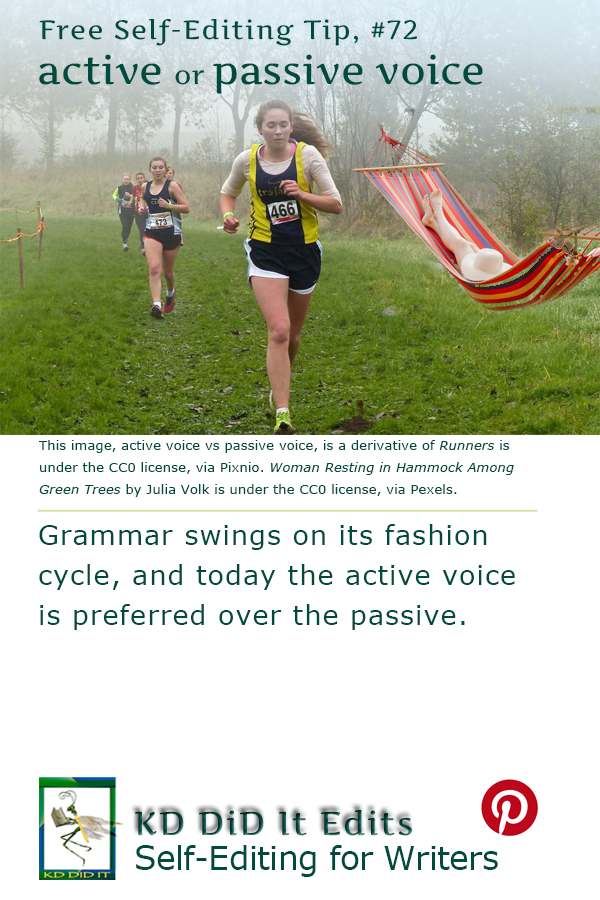Revised as of
26 Feb 2023
It’s a fashion thing. Back in the day, reports and studies were written up in the passive voice and were drier than dirt to read. Today, the preference is for active voice, and it does make for a more direct, clearer “story”.
I hate to weasel out of finding another word, but an active voice sentence is, well, more active. It feels livelier, brighter.
A passive voice sentence will make you think about closing your eyelids for a quick snooze. It’s clunky and less direct, making it more difficult to determine what is being said. Which does make it perfect for disclaimers as used by government, lawyers, the military, corporate jerks, etc., who are seeking to avoid responsibility for something. For the most part, you want to avoid this sentence style.
The experts do say, however, that it’s best to combine active and passive to keep a balance, to give readers a chance to rest up between actions. Besides, not everything in a story is action-able.
Grammar Explanations is . . .
. . . an evolving list of the structural rules and principles that determines where words are placed in phrases or sentences as well as how the language is spoken. Sometimes I run across an example that helps explain better or another “also known as”. Heck, there’s always a better way to explain it, so if it makes quicker and/or better sense, I would appreciate suggestions and comments from anyone on an area of grammar with which you struggle or on which you can contribute more understanding.
If you found this post on “Active versus Passive Voice” interesting, consider subscribing to KD Did It, if you’d like to track this post for future updates.
| Voice | |||||||||||||
| Definition: The voice is the verb, and your choice of verb tells the reader if the subject is acting or if s/he is being acted upon.
For what it’s worth, this distinction between active and passive voice applies only to transitive verbs. POST CONTENTS: Rule: There are two types of voice used when building a sentence: active and passive. |
|||||||||||||
| Active Voice | Passive Voice | ||||||||||||
|---|---|---|---|---|---|---|---|---|---|---|---|---|---|
| Focuses on the person or object performing the action and creating a livelier, more interesting sentence that is generally easier to understand. | Focuses on the person or object receiving the action, focusing on the action.
It also helps provide variety within the report or story. There’s only so much we, we, we a person can take! |
||||||||||||
| Rule: Uses an action verb with the subject performing that action. | Rule: Always use to be / to get + a past participle of a transitive verb. | ||||||||||||
|
|
||||||||||||
| Examples: | |||||||||||||
| Jason washed cars.
The man must have eaten five hamburgers. Marilyn mailed the letter. Bears live in the woods. At each concert, the soprano sang at least one tune from a well-known opera. Asbestos abatement teams will remove large chunks of asbestos-laden material from the hallways on the second and third floors. |
Cars were washed.
Hamburgers are being eaten by the man. The letter was being mailed by Marilyn. At each concert, at least one tune from a well-known opera was sung by the soprano. Large chunks of asbestos-laden material will be removed from the hallways on the second and third floors by asbestos abatement teams. |
||||||||||||
| Passive voice can be useful in the following instances: | |||||||||||||
| Rule: Doer of the action is unknown, unwanted, or unneeded. | |||||||||||||
| The president was praised for meeting with the victims of Hurricane Katrina. | |||||||||||||
| Rule: Action is to be emphasized and not the doer of the action. | |||||||||||||
| The high-jump record was finally broken last Saturday.
A suspect was questioned for sixteen hours by the police. |
|||||||||||||
| Rule: Recipient is the main topic. | |||||||||||||
| The victims of Hurricane Katrina were abandoned in the aftermath.
Some new laws were passed by lawmakers. |
|||||||||||||
| Rule: The passive voice constructions always appear after the modal auxiliary verbs. | |||||||||||||
Legend:
|
|||||||||||||
C’mon, get it out of your system, bitch, whine, moan . . . which words are your pet peeves? Also, please note that I try to be as accurate as I can, but mistakes happen or I miss something. Email me if you find errors, so I can fix them . . . and we’ll all benefit!
Satisfy your curiosity about other Grammar Explanations by exploring its homepage or more generally explore the index of self-editing posts. You may also want to explore Book Layout & Formatting Ideas, Formatting Tips, Grammar Explanations, Linguistics, Publishing Tips, the Properly Punctuated, Word Confusions, Writing Ideas and Resources, and Working Your Website.
Resources for Active versus Passive Voice
“Active / Passive.”Towson.edu. n.d. Web. n.d. <http://www.towson.edu/ows/activepass.htm>.
Pinterest Photo Credits:
Runners is under the CC0 license, via Pixnio. Woman Resting in Hammock Among Green Trees by Julia Volk is under the CC0 license, via Pexels.


